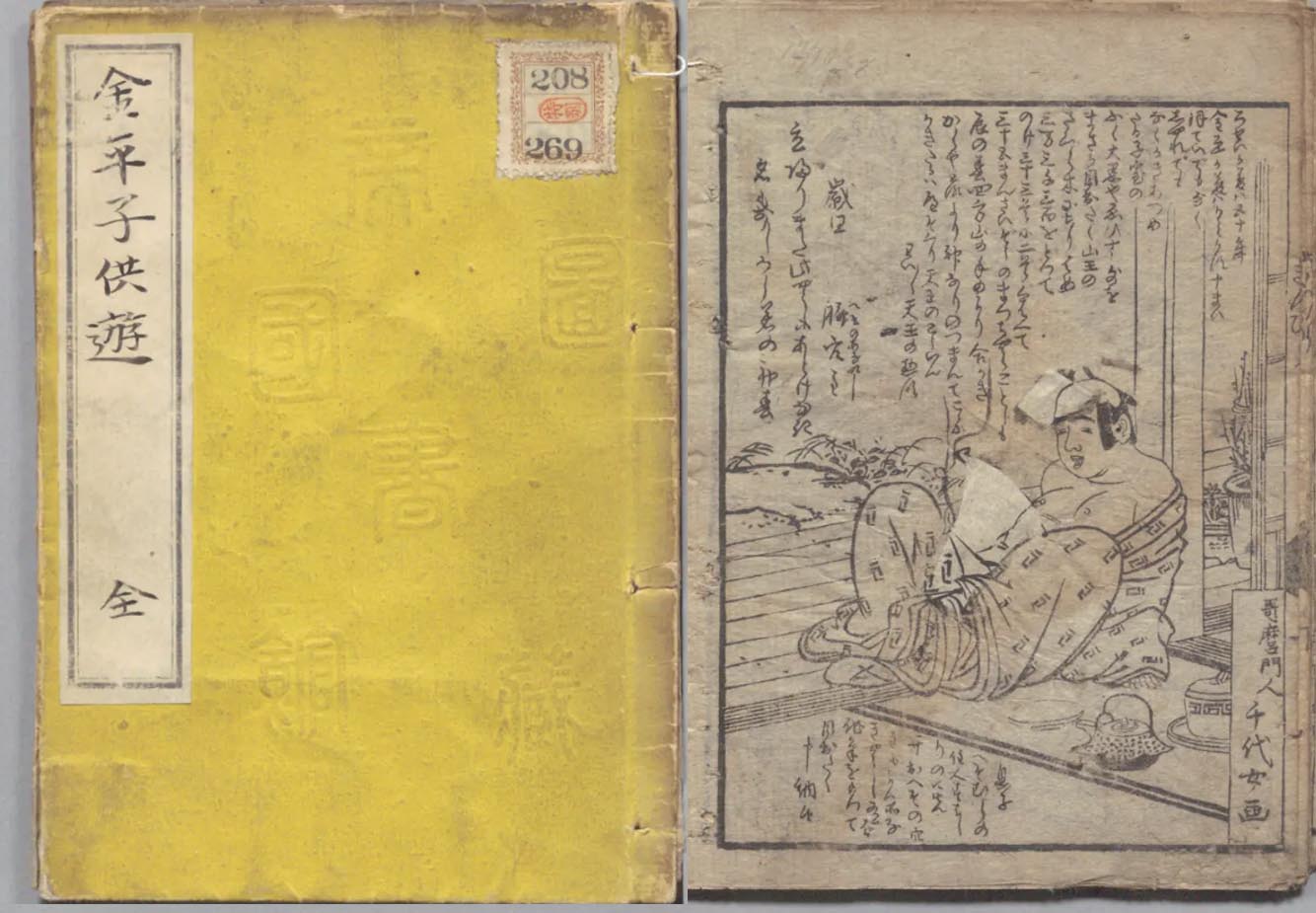[Taiga Drama ~Berabou] Episode 26
As the Tenmei famine causes the people to suffer from rising rice prices, Tsutaju’s mother, Tsuyo, appears!
Inspired by Tsutaju’s words, Tanuma Okitomo comes up with a solution to the rice riots.

Image
Kinpei Kodomo Asobi (Children's Play), Publisher: Koshodo, Illustration: Chiyojo, Disciple of Utamaro
Source: National Book Database
Anticipating rising rice prices, prices at Osaka’s Dojima Commodity Exchange first rose. Seeing this, rice wholesalers, brokers, and moneylenders hoarded rice, causing rice prices to double from last year’s levels. While this may seem like a recent news story, it’s actually the opening scene of episode 26 of the historical drama “Berabou,” in which a senior councilor receives a report of a poor rice harvest at Edo Castle. The Tenmei famine, partly due to the devastating eruption of Mount Asama in the previous episode, became a serious problem, resulting in many deaths from starvation. Upon receiving the report, senior councilor Tanuma Okitsugu quickly ordered merchants to lower prices, but it was unclear whether the merchants would comply, and the turmoil showed no signs of abating. Naturally, Tsutaju also faced the reality of a rice shortage. The rice in the storehouse is rapidly dwindling due to the servants’ meals and the artists and writers who barge in and eat.
What was the real nature of the real mother?
In episode 26, Tsutaju’s mother, Tsuyo, sneaks in among the guests and eats the remaining rice. Her real name is Hirose (Maruyama) Tsuyo, and she was Tsutaju’s biological mother, separated from him when he was seven years old. Her father is Maruyama Jusuke. Tsutaju is furious and tries to send her away, asking, “What have you come here for now?” However, with the help of his wife, Tei, who intervenes, saying, “When you want to be filial, your parents are gone,” Tsuyo ends up living with them. However, Tsuyo ends up styling guests’ hair for free, handing them books from the store and promoting them while Tsutaju does so. Tsuyo’s skills come in handy in an unexpected way. It’s believed that Tsuyo is actually highly educated. His mother, Tsuyo, was a member of the Yoshiwara Ren (a group of poets), and contributed several hokku poems to Tsutaju’s kyoka collections. She used the playful name Tsuta Karamaru Haha. As a biological mother, Tsutaju, eager to show her filial piety, lived with Tsuyo and worked energetically to ensure the success of the family business. It’s likely that Tsuyo and his wife, Tei, quickly became accustomed to the Koshodo business.
Meanwhile, only a few merchants followed Ikenaga’s orders and sold rice at the regular price, further increasing the poverty of the common people. Thinking, “Is there something we can do?”, Tsutaju came up with a bold idea.
Blow away the Tenmei famine!
Tsutaju, along with Ota Nanpo and others, launched the Tenmei kyoka boom. Thinking, “It’s precisely because these dark times bring laughter,” Tsutaju came up with the idea of compiling a celebratory kyoka collection for the New Year. Tsutaju’s vision was supported by Ōta Nanpo and Utamaro, who worked with him to create a new kibyōshi.
Tanuma Okitomo, the newly appointed wakadoshiyori (young councilor), came to visit Tsutaju. He came to ask for advice on how to get merchants who were withholding rice to release more, believing that the only way to motivate merchants was to borrow their wisdom. Tsutaju then told him about the kibyōshi and how, even if he produced a good book, he could not be included in the group of jihon wholesalers and was therefore unable to distribute it freely, which had caused him great hardship under the “nakama system” of the book world. Inspired by this story, Okitomo proposed abolishing the stock nakama system of rice brokers and wholesalers. He wanted to break the ties between rice dealers and prevent withholding and price manipulation. Today, rice distribution is liberalized, and anyone can collect, ship, and sell rice. However, with the “210,000 tons of missing rice” becoming a hot topic, consumers still have a lingering distrust for rice distribution. So, while watching episode 26, I couldn’t help but think that if we made the “smart food chain” concept mandatory, which links data from rice production to processing, distribution, sales, and consumption, it would also make it possible to see which businesses are withholding rice.
